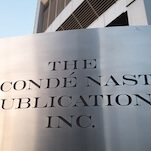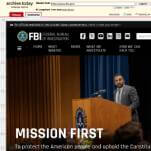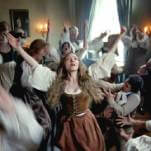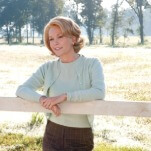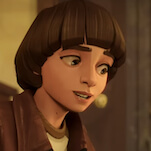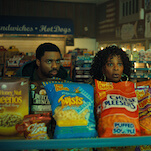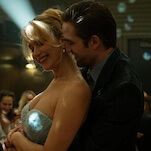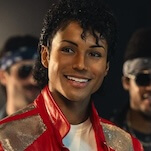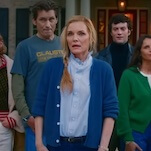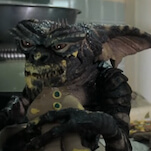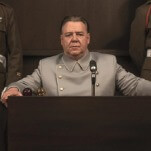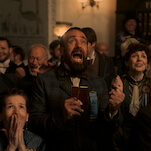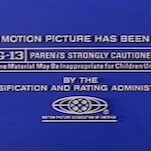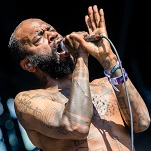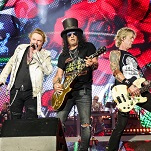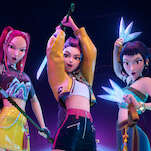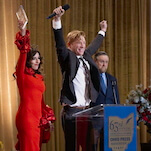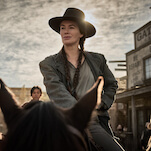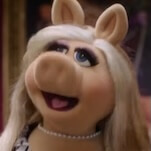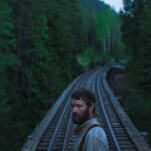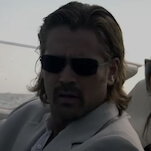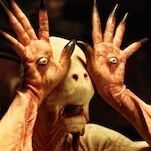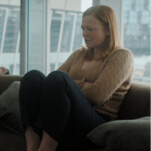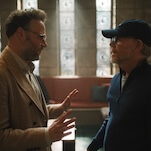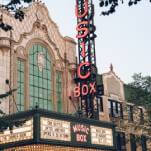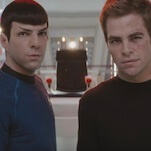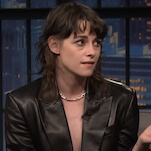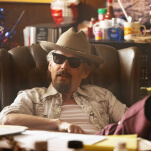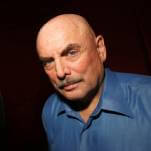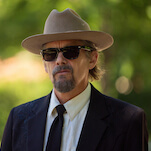James Toback is a quintessential auteur. Since Karel Reisz directed his screenplay of The Gambler in 1974, Toback’s films have focused obsessively on their creators’ pet themes: sexuality, class, race, gambling, compulsions, music, sports and philosophy. After graduating from Harvard, Toback wrote a book about football great whose title—Jim: The Author’s Self-Centered Memoir On The Great Jim Brown—reflected the intensely personal, autobiographical nature of much of his subsequent work. Brown went on to appear in Toback’s cultishly revered 1978 directorial debut Fingers, a moody drama about a tortured young man (Harvey Keitel) torn between working as an enforcer for his father and his dreams of becoming a concert pianist.
I wasn’t there, but I would think, in addition, the fact that Tyson has spoken so bitterly about it over the years to me, when we’ve been alone, there’d be no point in his constantly protesting his innocence to me, as if I could do something about it. He says, I’m not saying I haven’t behaved as if, uh… What’s the phrase he uses? Taken advantage of other women. But in no way did I take this woman’s chastity—he puts it in the Victorian language. I would be deeply surprised if he had ever raped anybody, and I would be appalled, but it would be a completely inconsistent freakish absurdity if he’d been lying all these years to me about this.
AVC: The film is told entirely from Tyson’s perspective. In regards to the rape case, did you think about maybe getting the other side?
JT: No, because it’s not an attempt to retry a case, or to pretend that there’s any way of getting the literal truth about any situation depicted any more than there is in a conversation with a friend. If I’m talking to a friend and he’s telling me about what happened to him over the weekend, I’m not gonna call the people he referred to to find out what their version of his stories were. And in this case it was supposed to be a self-portrait. The idea was to take Tyson in his own words, in his own physical being, and present him—not to say this is all literally true. The movie doesn’t advocate that, and in fact he is himself vague and inconsistent about certain things.
AVC: In what sense?
JT: Well, he talks about being insane, and that he has only himself to blame for the problems that he’s caused himself, and talks about leeches leeching off him but he’s a leech too. Those are phrases that he uses in effect to condemn himself without going into illustrations of it. The idea was not to grill him but to let him, ‘cause he is so articulate and so poetic in the way he describes things, to let him go in his own words about whatever subjects I threw out to him that triggered some thoughts and memories. That’s more what I did than interview him; I didn’t ask him specific questions. I would say “what are your earliest memories, what are your feelings about sex, what do you think of fear?” Just subjects and let him do riffs on those. And then the idea was to take that self-portrait and cast it in some fashion aesthetically and stylistically in a way that would reflect its protagonist. That’s how I arrived at the split-screens and the multiple voices, because it’s clear that he’s got all these voices going on in his head, he’s got a fractured consciousness. So I wanted that to be felt aesthetically and not just to be observed intellectually.
AVC: Do you see a lot of yourself in Mike Tyson?
JT: Well I certainly feel I have the personality of what he calls an extremist, somebody who is always pushing it to one extreme or another. He says nobody can understand the mind of an extremist who isn’t one. Similarly, no extremist can understand the mind of a moderate. When people are temperate in their behavior, in their lives, someone who is addictive or extreme or obsessive can’t understand how people can just go through their lives in the middle, and people who are rational and balanced can’t understand the opposite. I’m one who’s in the extreme camp in almost every area of my life and I always have been. I’ve observed that I’m in a minority, but I never understand people who are measured. And it may be one of the foundations of the odd relationship I’ve had with him over the years with him. We’ve had a lot of long interesting conversations in the middle of the night about all the fundamental aspects of life, which are in effect the fundamental aspects of this movie, namely identity, race, sex, love, madness, crime and death. And boxing.
AVC: How did your relationship with Mike Tyson begin?
JT: I met him on the set of The Pickup Artist in 1985. He’d come to meet [Robert] Downey [Jr.]. We hit it off immediately. It was just a natural easy rapport, which is actually not difficult to start with him because it’s his way. He speaks in a kind of unadulterated, uncensored way, and gives you a sense that he is going to be direct and truthful with you and you feel obligated to be that way with him. We had a long walk through Central Park at about five in the morning in which it became very clear to me anyway that we had a lot to say to each other despite superficial differences and that it would be probably a rather interesting relationship.
AVC: He was a teenager at that point, was he not?
JT: Nineteen.
AVC: How has he changed over the years?
JT: Relative to today he was a wide-eyed innocent. He was full of exuberance and hope and a feeling of confidence and general sense of trust of the world. He certainly looked like someone who was gonna be a very happy successful person.
AVC: Was this before Cus D’Amato [Tyson’s mentor and first manager] died? Was that the fall from grace?
JT: It must have been before. It definitely was a dividing line because what happened was he moved then out of this very militaristic, tightly controlled environment in which he was not really free to get into trouble, he was basically forced into a dedicated sense of things, and did his work on the grounds and had a life that was pretty set. So moving away from that into the real world I think had to be a bit of a shock, particularly for somebody who was unprepared for it. Cus was a great teacher of boxing and discipline and mental and physical skills in the ring, but he certainly didn’t go out of his way to instruct people on how to live outside of his house.
AVC: Do you think Tyson sees you as a father figure?
JT: Clearly he didn’t have a father. Cus was and then he made the unfortunate substitution of Don King as a father figure. One he regretted rather quickly.
AVC: How did Tyson go from being a friend to a subject of your movies?
JT: Well, he was in Black And White, and that struck me as a very impressive performance. He was great in the improvised scenes with Downey and Brooke Shields, and then in the next scene where he’s talking meditatively and self-reflexively about being incarcerated and being strip-searched, and wanting both to kill the guy who was about to betray him and to withhold murder because he was trying to maintain an image. He was very impressive and articulate. And I thought I could take this Mike Tyson and expand it into a movie easily. And I suggested it to him and he said whenever you’re ready, let’s do it.
[pagebreak]
AVC: How much of a framework did you give Mike Tyson or Robert Downey Jr. or Brooke Shields when you were making Black And White?
JT: I told them what the intentions were. I said to Tyson, just stand by the window, Downey’s gonna come over and chat with you, and just respond. And to Downey I said hit on Mike relentlessly until he responds, and to Brooke I said shoot it with your minicam and respond any way you like. The initial effect was that Downey hit on Tyson so relentlessly that Tyson did respond. Oh, actually Downey said to me, “what if he kills me?” I said well, it raises an interesting question. As of right now you’re headed for a likely death in a parking lot in Santa Monica or a motel in Culver City. What’s better, that death or dying by being killed live by Mike Tyson? And he cracked up and went ahead and hit on him. And he crawled away, and I almost called out to Brooke, “don’t pay any attention to Downey”, ‘cause I was afraid she was going to be solicitous of Downey, which would have blown the rest of the scenes. But fortunately she had very good instincts and hit on Mike and discombobulated him. That was played out to the end of the scene, and they came up with all that stuff.
AVC: So Downey was still in self-destructive mode at that point in his life?
JT: Yes. He had just come out of either rehab or jail, I can’t remember. He came out with a less than determined attitude. I mean, now you’re talking to someone who is robotically secure to the extent that any ex-addict is, but I mean he’s really got his program organized. He’s sort of a fortified walking institution.
AVC: He’s like some sort of Iron Man!
JT: Yes, he’s been transformed into a model of recovery. But when he was vaguely thinking about how long he might stay away from drugs, then it was just a question of time and he knew it.
AVC: Were you surprised at the transformation?
JT: I was. I was surprised at the degree—first of all I was surprised that he was able to give up drugs for this length of time, and there’s no sign that he’s going back. But in addition I was surprised at how completely he’s abandoned his whole inventive improvisational artistic nature, and how quickly he’s embraced money and fame as the only thing he’s seeking. The total break from thinking of film as a means of personal expression, to the thinking of it as a vehicle for wealth and fame. Which is of course what 99% of people involved in it do. It’s just that he was a great improviser, inventor and creator when he was given a chance to be. He was very boring on the screen when directors just wanted him to do what they wanted him to do. You know, with Ally McBeal, where he was as if he were in a straitjacket, there was nothing for him to do. But when he was given room to do things he just gloried in it and was so terrific at it. So the fact that he seems to have said “that was then, now I’m gonna make some serious money here.”
AVC: For a long time, he seemed to be kind of an alter-ego for you.
JT: At this point, it’s less the track that I myself would be interested in being on. I could enjoy a movie like Iron Man, but I wouldn’t want to direct it. It’s not the channel that I’m on in this journey.
AVC: Can you see yourself working with him again?
JT: I can see myself working with him the way we worked before, not in a conventional way. His talent is not conventional. He’s now being finally recognized as a tremendously talented guy, but he’s not an automatically talented guy. He’s talented when he is allowed to show what he can do. In Two Girls And A Guy he shows just about everything, that’s a real display of incredible virtuosity. That’s when he’s at his best, when he’s inventing and responding to the moment and coming up with original things under pressure. Just to play out preordained direction and script without any chance to turn it inside out, I think is never gonna be… He’ll never do his best work that way.
AVC: Do you feel like he’s gone from having this extreme personality—how you described yourself and Tyson—to something more normal?
JT: Yeah, he got married, literally and figuratively. There are marriages and there are marriages, and his is a marriage. Some people get married and they remain “I,” some get married and become “we.” So he’s a “we.”
AVC: Sometimes there’s an ego-blurring that happens with couples.
JT: Exactly. Where we decide what we do, it’s not I’m doing this and you’re doing that, and it’s okay if you’re over there and I’m over here. No, we are figuring this out together. That was, I must say, highly unexpected.
AVC: You’re known for the highly personal nature of your films. Have you ever made a movie that wasn’t on some level autobiographical?
JT: I’m not a woman, so I would say the movies Exposed and When Will I Be Loved, which were basically written for Nastassja Kinski and Neve Campbell, were only autobiographical in a very oblique sense. The themes are the same, definitely. I think, without sounding too high-minded about it, if you approach film as an artform that you’re expressing yourself through, there’s a limited number of themes that any artist has had. Look at any of the people I’ve admired—Dostoyevsky, Conrad, Oscar Wilde—all of them had certain themes that they’re dealing with over and over again. It isn’t that all of sudden Dostoyevsky’s gonna be writing about the world that Henry James wrote about. They’re just not in the same milieu. I’m pretty much where I am, I don’t want to go elsewhere. I like mining this terrain. I like the idea of switching contacts, but this is the world that I like to deal with.
AVC: I remember hearing about The Beat That My Heart Skipped and thinking that sounds impossible. Some movies are so rooted in a time and place and sensibility that putting them in another country seems insane. How did you feel about the film?
JT: First of all, I was flattered ‘cause it’s the only French movie ever made remaking an American movie. No original American movie has ever been remade as a French film. And also the fact that it was done by a very good director, and a very good actor. I thought it was extremely well-done. I was glad that it called attention to Fingers. A lot of people revisited Fingers as a result, or discovered Fingers. I did not think it was a great idea to change the ending and have him get away with beating up the—and not killing him, he cries instead of killing him, and I didn’t believe that moment. And then the end, which has him happily there with his girlfriend at the concert, I really don’t believe, because that Russian gangster would not have let him live. You don’t beat up a guy like that and then he says, “Well I guess I lost the fight fair and square.” It’s, “I’m gonna get that guy”, and since he’s very much available to be gotten I just didn’t believe that he wouldn’t get killed. So that kind of stuff actually always bothers me in any movie I see, but particularly since I knew the psychology behind the scenes I felt that was a mistake. But overall I thought it was a very impressive film and very well-done.
AVC: Harvard Man was a project that had been floating around for decades. Are there other pet projects that you would like to someday get made?
JT: I wrote this movie about Victoria Woodhull for Faye Dunaway, which George Cukor was going to direct. I worked with Cukor on it for a year and it never got made. In Faye Dunaway’s autobiography the following sentence appears: “It is one of the great tragedies in the history of the movie business that James Toback’s Victoria Woodhull script has not yet been made.” So I’ll take Faye’s word for it.
AVC: Do you think it was one of the great tragedies in the movie business?
JT: Might be a bit hyperbolic.
AVC: One of the great tragedies of western civilization?
JT: Yes, that would be better. I feel like Alain Delon, who once said, “It doesn’t matter that I’m not a star in America because I’m a huge star in France, I’m a legend in Spain, and I’m a god in Japan.” So yeah, one of the true tragedies of western civilization. I think that would be—also, I’m writing a movie now called The Director which I’m very eager to make. Those are the two right now that I’d be really interested in doing.
AVC: What’s The Director about?
JT: It’s about a guy in middle age and making another movie, his 10th movie, and he’s going through some serious doubts about himself, his life, his career. He’s forced to confront his realities while making this movie and writes them into the movie. So the movie becomes a reflection of his life and his life is influenced by the movie he’s making. And you’re on the set of this drama throughout, that’s the substance of the movie. And it becomes criminal, and a lot of intriguing things happen.
AVC: You had an interesting relationship with Barry Levinson on Bugsy. How was your relationship with the director when you made The Gambler?
JT: With Karel Reisz? He was my teacher. I never went to film school, never had a single hour of film study. And I wrote the script not even knowing what the script form was. I had to look up a script ‘cause I didn’t know what the proper form was. Karel spent a year with me in London going over everything in my life that resembled the film, the character, the context. We studied Las Vegas together. There was no one like Karel. He was a truly great human being. Then when it was finished, I was in the editing room, and that’s how he was my film course. So when I made Fingers I said I can make my own movie now, because I’ve been studying with Karel Reisz by having my own movie made. And I never felt I needed to go back.
AVC: If you had directed Bugsy, how would it have been different from Barry Levinson’s version?
JT: I don’t know but I doubt it would have been as good, unless I directed it and the three of us [Levinson, himself and star Warren Beatty] were all together. It was a great collaboration and the three of us fed each other. If any one of us had directed it and the other two had not been there, the movie would have suffered. Did you see the new DVD? Did you see the three of us talking? You gotta see it, it’s hysterical. We had a great time. It was actually one of the best times I’ve ever had in my life and I’m sure the two of them feel the same way. It was very productive, very creative, but also the most fun I ever had on a movie. We had so long to do it, it seemed to be an unlimited amount of time.
AVC: How was your experience with Pickup Artist?
JT: I felt there was a bit too much time with that particular movie. You wait around and sit in your trailer and that’s not necessarily a good thing for actors. Wasn’t good for Downey in that movie. There’s something to be said for shooting a movie on the run, being very fast. But Bugsy was an extreme form of, not only a movie about Hollywood, but a movie that was Hollywood and Las Vegas. We pulled out all the stops, and we weren’t rushed. We had time to let ideas percolate and talk about them, and each one would be open to what the others were saying. It was a once in a lifetime collaboration.
AVC: On the one hand it has your intensity and pet themes, but it also has a bigness and gloss that isn’t in your other films.
JT: Exposed has it in a different way, it has a real size and scope. It’s also partly that it’s a period piece. It’s the era itself that was depicted, and if you’re gonna do it right you have to do it that way. It was palpable.
AVC: A lot of your recent films have been improvised or largely improvised. What led to this shift away from scripting?
JT: It’s a question of what’s the scene. Half of Black And White is improvised, half is strictly written. Half of When Will I Be Loved is strictly written, half is invented. For instance the scene with Dominic Chianese and Neve Campbell had to be very tightly scripted. It just never would have worked otherwise. The scene with her and me walking in a street in Columbia had to be improvised. It would’ve felt wrong any other way. I think you have to take it case by case.
AVC: Tyson seems to be one of your recent muses, and Jim Brown was one of your first sources of fascination. Do you think similar things attracted you to both men?
JT: What attracted me to Jim was moving into that world. It was a hedonistic era, pre-AIDS, with a lot of extremely impressive black athletes, of which Jim was by far the most gifted, dealing with life in a very bold way in a kind of wild, open-ended, free-spirited time. I just thought it’d be a great learning experience. I’d been married to the granddaughter of the Duke Of Marlborough just before that, and I thought this would be an interesting juxtaposition, in what I still considered to be a learning part of my life. Mike and Jim are quite different people. Jim is a really well controlled person. Jim is an organized character, a focused character; he knows what he’s saying, what he’s doing, what he wants to accomplish. And Mike is in a kind of parallel reality. The only thing they really have in common is that I think each is the best in the history of his sport.
